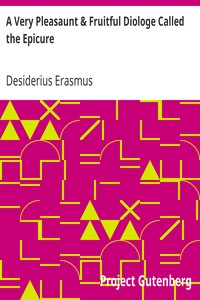A Very Pleasaunt & Fruitful Diologe Called the Epicure by Desiderius Erasmus
"A Very Pleasaunt & Fruitful Diologe Called the Epicure" by Desiderius Erasmus is a philosophical dialogue written during the mid-16th century. This work falls into the category of philosophical literature, exploring themes around pleasure, virtue, and the nature of a good life. The dialogue primarily discusses the concept of happiness and how true contentment stems from a virtuous life rather than from indulgent pleasures. The book features two interlocutors, Hedonius and Spudeus,
who engage in a back-and-forth discussion about the essence of happiness. They critique the Epicurean pursuit of pleasure, emphasizing that genuine fulfillment arises from living a virtuous and godly life. Through their discourse, Erasmus challenges the superficial understanding of pleasure, advocating for a deeper appreciation of the mind and spirit in achieving true happiness. The dialogue also touches on the Christian perspective of virtue and how it is integral to experiencing a joyous existence, ultimately positioning Christ as the ideal model for happiness. (This is an automatically generated summary.)
Read or download for free
| How to read | Url | Size | |||
|---|---|---|---|---|---|
| Read now! | https://www.gutenberg.org/ebooks/16246.html.images | 104 kB | |||
| EPUB3 (E-readers incl. Send-to-Kindle) | https://www.gutenberg.org/ebooks/16246.epub3.images | 134 kB | |||
| EPUB (older E-readers) | https://www.gutenberg.org/ebooks/16246.epub.images | 133 kB | |||
| EPUB (no images, older E-readers) | https://www.gutenberg.org/ebooks/16246.epub.noimages | 90 kB | |||
| Kindle | https://www.gutenberg.org/ebooks/16246.kf8.images | 385 kB | |||
| older Kindles | https://www.gutenberg.org/ebooks/16246.kindle.images | 370 kB | |||
| Plain Text UTF-8 | https://www.gutenberg.org/ebooks/16246.txt.utf-8 | 87 kB | |||
| Download HTML (zip) | https://www.gutenberg.org/cache/epub/16246/pg16246-h.zip | 133 kB | |||
| There may be more files related to this item. | |||||
Similar Books
About this eBook
| Author | Erasmus, Desiderius, 1469-1536 |
|---|---|
| Title | A Very Pleasaunt & Fruitful Diologe Called the Epicure |
| Credits |
Produced by David Starner, Louise Hope and the Online Distributed Proofreading Team at www.pgdp.net. |
| Reading Level | Reading ease score: 68.5 (8th & 9th grade). Neither easy nor difficult to read. |
| Language | English |
| LoC Class | PA: Language and Literatures: Classical Languages and Literature |
| Subject | Imaginary conversations |
| Subject | Dialogues, Latin (Medieval and modern) -- Translations into English |
| Category | Text |
| EBook-No. | 16246 |
| Release Date | Jul 8, 2005 |
| Most Recently Updated | Dec 11, 2020 |
| Copyright Status | Public domain in the USA. |
| Downloads | 197 downloads in the last 30 days. |
| Project Gutenberg eBooks are always free! | |

